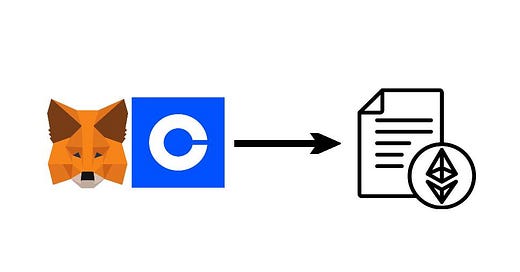Revolutionizing Web3: The Benefits of Account Abstraction
Good day everyone, welcome to the new week! Today, we'll examine a crucial advancement that will advance web3. In this article, I will summarize Account Abstraction, a game-changer in web3 user experience. It is said to reduce hacking, facilitate the widespread adoption of web3, and solve problems with traditional MetaMask wallets and other EOAs in use today.
Introduction
A better UX is essential for widespread adoption of web3. Saying farewell to traditional MetaMask wallets and other EOAs is necessary. Signing multiple times before performing a transaction will no longer be required, thus reducing the risk of hacks.
This is all possible with Account Abstraction.
Account Abstraction converts an EOA into a smart contract, allowing a web3 wallet to be programmable by the user.
A brief overview of Ethereum accounts:
There are two types of accounts on the Ethereum blockchain:
1. Externally Owned Accounts (EOA) - such as MetaMask and Coinbase wallet
2. Contract Accounts
A Contract Account is a code (smart contract) in the blockchain that determines the behavior of the account. Unlike EOAs, contract accounts do not have a private key or user control, but are instead controlled by the code within.
EOAs have three key features:
1. A balance to represent ETH owned by the user
2. A nonce to ensure the uniqueness of each transaction
3. An address to distinguish the uniqueness of the EOA.
What secures an EOA?
An EOA is secured by a signer or keypair, which prevents unauthorized access. It consists of two keys: private and public. The private key signs transactions, while the public key verifies signatures. Losing your key means losing access to your account. To stay safe, you can use a hardware wallet to store your keys. However, this hinders mass adoption of web3 and leaves the user vulnerable to hacks from the random signing of transactions.
Account Abstraction offers a solution. By transforming an EOA into a smart contract, it allows the user to define valid transactions without the need for a private key.
With account abstraction, EOAs transform into smart contracts, enabling transaction authorization to be programmable by users.
Users can use multiple signers for added security against fraud.
With Account Abstraction, users can approve and transfer tokens in a single transaction, enabling batch transactions.
Code can be written to recover funds in a wallet, eliminating the need for private keys.
A code can also be written to temporarily halt fund transfers during recovery efforts.
Gas fees can be paid in any token, and projects can cover these costs for users.
Account Abstraction enables plug-ins. Plug-ins make accounts more flexible and modular by enabling new features through third-party development during account creation and allowing users to add or remove features afterwards like an app store for your account.
What's preventing the adoption of this in Ethereum?
Most Ethereum wallets today are EOAs with limited security and user experience that cannot be programmed. Most dapps on Ethereum are not compatible with smart contract wallets as the Ethereum ecosystem is primarily built around EOAs.
The future?
The future of this technology in Ethereum is uncertain. However, Layer 2 solutions like StarkNet are working towards bringing this technology to their ecosystem at full speed.
Conclusion
Account Abstraction has the potential to greatly enhance the web3 experience for users by providing a better user experience. A better UX is crucial for the widespread adoption of web3 in society. The implementation of Account Abstraction can help achieve this goal and bring about a more accessible and user-friendly web3 environment.
TL;dr
Account Abstraction revolutionizes the web3 user experience by reducing hacks, enabling mainstream adoption of web3, and fixing issues with traditional MetaMask wallets and EOAs. It transforms an EOA into a smart contract, making web3 wallets programmable for user customization. EOAs have a balance, nonce, and address, secured by a private/public key pair.
Account Abstraction eliminates the need for keys by transforming the account into a smart contract, enabling programmable transaction authorization, multiple signers, batch transactions, and gas fee payments in any token. It also enables plug-ins for added flexibility and customization. The main obstacle to adoption is that most Ethereum wallets are EOAs and most dapps are not smart contract wallet compatible. StarkNet is focused on bringing this tech to its ecosystem. Account Abstraction delivers a better user experience, essential for the mass adoption of web3.




